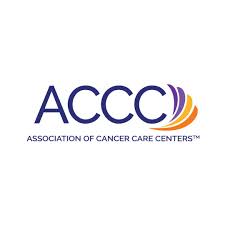- Center on Health Equity & Access
- Clinical
- Health Care Cost
- Health Care Delivery
- Insurance
- Policy
- Technology
- Value-Based Care
In Charleston, West Virginia, Tracking MPN Symptoms Becomes a Priority
Charleston Area Medical Center (AMC) Vandalia Health was among 3 participants in the Association of Cancer Care Centers' Quality Improvement Program for myeloproliferative neoplasms.
When patients with myeloproliferative neoplasms (MPNs) must travel 2 hours for appointments with a cancer care team, capturing all their symptoms to ensure proper treatment is vital.
ACCC logo | Image credit: ACCC

So, when Charleston Area Medical Center (AMC) Vandalia Health, located in Charleston, West Virginia, signed on to be part of the Association of Cancer Care Centers (ACCC) MPN Quality Improvement Program, systematic and accurate recording of patients’ symptoms was a priority. In a 12-month period, the cancer program serves 78 patients with polycythemia vera, 111 patients with essential thrombocythemia, and 48 patients with primary myelofibrosis.
Charleston AMC serves a large area in southern West Virginia, including some heavily rural areas. Its team includes general medical oncologists and hematologists who treat all types of cancers, 5 patient navigators, and 2 financial navigators who deal with insurance coverage, transportation issues, and other barriers to access. There is 1 social worker as well as nurses and other team members. Complementing the team are outside partners who help Charleston AMC meet multiple social needs.
As with ACCC Quality Improvement Program participants from Perlmutter Cancer Center at NYU Langone Health and Kent Hospital in Rhode Island, the multidisciplinary team in Charleston West Virginia, first took part in a webinar on MPN patient management.1
The ACCC Quality Improvement program was supported by Incyte.
The Charleston AMC team learned about the MPN Symptom Assessment Form Total Symptom Score (MPN-SAF TSS),2 a validated MPN patient-reported outcome tool that is recommended in the National Comprehensive Cancer Network Guidelines. Patients complete the assessment when they arrive at their appointments, giving providers an overview of symptoms that can be tracked over time.
Fatigue/inactivity is a common symptom of MPNs. | Image credit: Harvard Health

The tool lists common MPN symptoms on a grid and asks patients to rate symptom severity on a scale of 1 to 10; in doing so, it reduces the likelihood of patients forgetting to name a symptom and helps patients realize that some symptoms they may have attributed to other causes may be due to their MPN diagnosis. Common symptoms of MPNs include fatigue/inactivity, inability to sleep, abdominal pain, filling up quickly during meals, headaches, inability to concentrate, and dizziness.
ACCC program faculty member Andrew Kuykendall, MD, of the Department of Malignant Hematology at Moffit Cancer Center described the utility of the MPN SAF-TSS in the published summary on the ACCC website.
“I think the symptom score is really nice. In general, the treatments that we offer patients with [MPNs] are largely palliative in nature, whether it is improving anemia, splenomegaly, or other symptoms. So, when that is the case, I think we have to reliably assess how patients are doing using a validated symptom score,” he said in the summary.
“We have the tool printed on paper; it is not incorporated into our [electronic health record (EHR)], yet. But it is something that we can keep track of over time and use to ensure [that] we are meeting the goal of improving quality of life and functionality for patients.”
Changes in practice. The 6-month project of the Charleston AMC team started with an effort to create a standardized education program for staff about the MPN SAF-TSS. Then, project leaders sought buy-in from physicians for their project before offering the education program, which included how to interpret data collected.
A key element was incorporating the tool into the workflow, including creating an EHR macro to make it easy for physicians to use the tool, then upload completed forms to patient charts.
At the 3-month mark, the tool was rolled out to patients, with Charleston AMC reporting a physician adoption rate of 85%.
“The workflow was the biggest part for us—who would be responsible for what—regardless of [whether] it is electronic or not,” Beverly Farmer, RN, BSN, OCN, NE-BC, clinical practice administrator at Charles AMC, said in the ACCC summary.
“You really need all the disciplines involved. I think the planning stage is probably one of the most crucial. If you do not have a quality [assurance] person that can help, then your nurses are great people to help lead a quality initiative as part of their career growth and development within your program.”
References
- Advancing care for patients with myeloproliferative neoplasms. Association of Cancer Care Centers. Accessed January 12, 2025. https://www.accc-cancer.org/home/learn/cancer-types/hematologic-malignancies/advancing-care-for-patients-with-myeloproliferative-neoplasms
- Emanuel RM, Dueck AC, Geyer HL, et al. Myeloproliferative neoplasm (MPN) symptom assessment form total symptom score: prospective international assessment of an abbreviated symptom burden scoring system among patients with MPNs. J Clin Oncol. 2012;30(33):4098-4103. doi:10.1200/JCO.2012.42.3863
